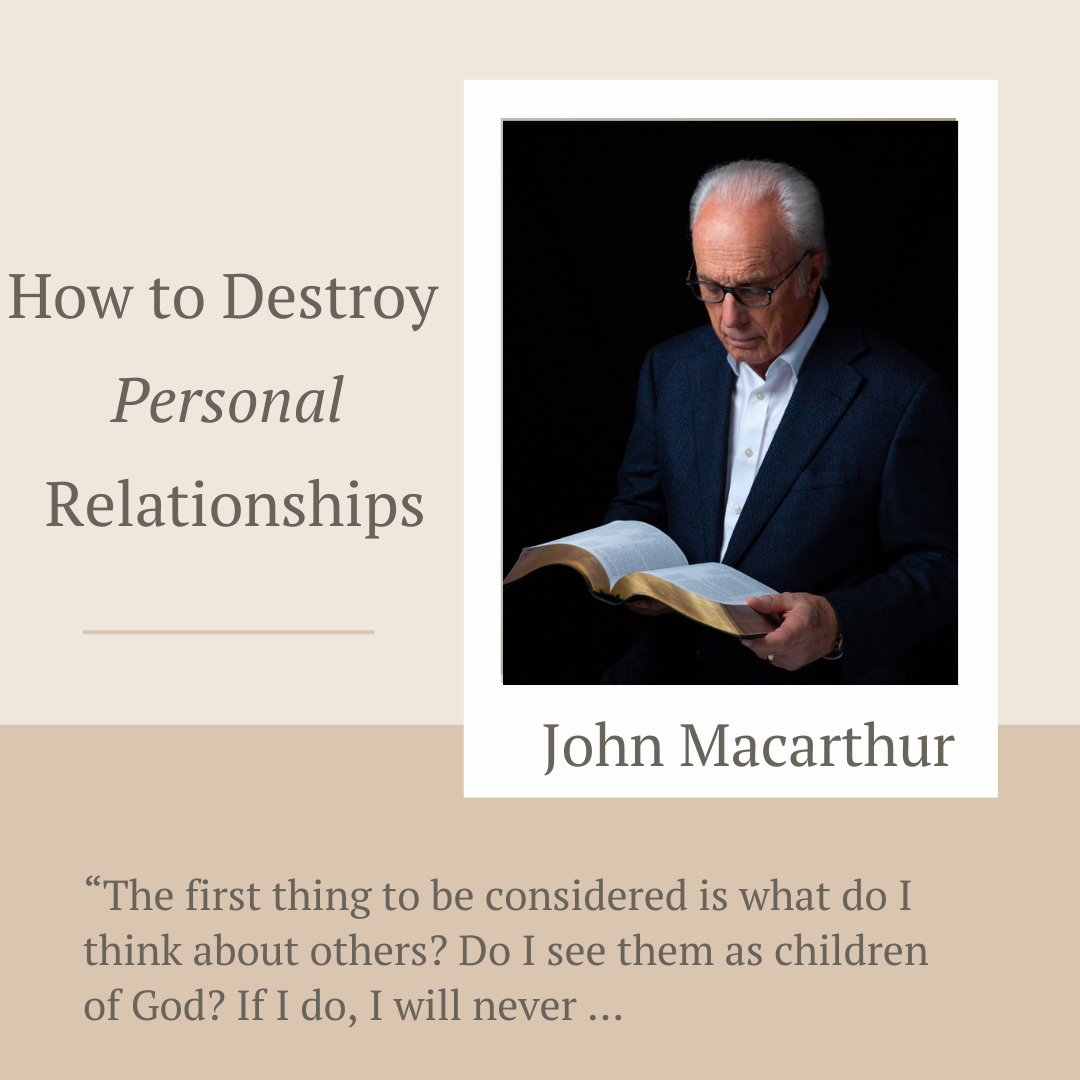If there was a book titled, “How to Destroy Personal Relationships” I wonder how many people would actually want to read it? Can you imagine such a publication, reading like a manual – giving step-by-step actions that a person can take in order to destroy a relationship?
It sounds so extreme and absurd to even suggest such a book ever being written and yet, … …
it has been written.
There is a book that actually provides us with a list of seven things that God hates, that are an abomination to Him because of the impact they have against Him and in our relationships. Each of these seven things ultimately destroy all personal relationships, starting with a professing Christian and the relationship they claim to have with the Lord.
What is this book?
It is our Holy Bible.
Our Bible gives us the principles, precepts, and instructions in how to have meaningful, godly, gracious, merciful, and loving relationships. Nevertheless, our Bible also has warnings and clearly defined directives, commands, and knowledge in how relationships can not only be injured but completely destroyed and void of God’s participation and blessing.
John MacArthur gives us insights into one of these abominations … … …

John MacArthur explains:
“The sin of slander is saying something false about a person with a malicious intent to verbally publish it around. You perhaps remember that very, very familiar passage in the sixth chapter of Proverbs – “These things does the Lord hate, these seven are an abomination to Him: a proud look, a lying tongue, hands that shed innocent blood, a heart that devises wicked imaginations, feet that are swift in running to mischief, a false witness that speaks lies and he that sows discord among brothers.” God hates a lying tongue. God hates false witness. God hates that which sows discord.”
In Proverbs 6:14, “discord” is translated from the Hebrew (madan), meaning “strife, bitter conflict, heated and often violent dissension.” “Sowing” discord implies spreading conflict or scattering it among those who will listen. The passage reveals that an individual who sows discord is corrupted by sin and afflicted with a perverted heart. Solomon repeated the sentiment in Proverbs 16:28: “A perverse person stirs up conflict, and a gossip separates close friends.” It is critical that if we profess to be a Christian, we are commanded in Proverbs 6:16–19, to not sin by doing the very seven things the Lord hates, because one who practices gossip and slander and sows discord {bitter conflict} among professing Christians is demonstrating their perverted and unregenerated heart.
John MacArthur continues…
“Three out of those seven things that God hates have to do with how you speak about other people. In Exodus chapter 23 and verse 1, you have the command of God against this sin, a command that is reiterated with tremendous force in the New Testament in these words, Ephesians 4:31, “Let all bitterness, wrath, anger, clamor and evil speaking” – same term is used here – “be put away from you with all evil.”
And what he is talking about there are the sins that destroy personal relationships, one of which is slander, and he says all those sins that destroy personal relationships need to be put away. In Psalm 50, there are two verses, verses 19 and 20, which basically describe the wicked as characteristically addicted to slander. It is characteristic of wicked people to slander. Jeremiah 6:28 and Jeremiah 9:4 say essentially the same thing, that evil men walk with slander. It is to say that it is for them a way of life. Nothing makes people feel better about themselves than to slander somebody else.
In Matthew 15:19, our Lord Jesus associated slander with the violent sins that proceed out of a grossly wicked heart. Scripture chronicles the devastating affects of this kind of speech, this defaming speech. In Proverbs 16:28 and Proverbs 17:9, the Scripture says it utterly destroys friendships. In Proverbs 18:8 and 26:22, the Scripture says it leaves deep, scarring wounds in the soul of the one slandered. In Proverbs 26:20, it reveals how it leads ultimately to conflict. And Proverbs 6:19, as I read to you a moment ago, how it sows discord among the brothers.”
We need to understand, God will not participate with us in any attempts to hurt, damage, or reputationally destroy someone else with our words.
Slander and gossip come from the heart. (Let that sink in.)
And that should righteously frighten us toward “godly sorrow that brings repentance that leads to salvation.” 2 Corinthians 7:10
The theologians at GotQuestions.Org have shared in one of their online articles:
The old adage “Sticks and stones may break my bones, but words will never hurt me” is not true.
- Words can do a great deal of damage, especially to those who have been slandered. Slander is making a false verbal statement that damages someone’s reputation. Slander differs slightly from libel in that libel is a written defamation of character; slander is only spoken. The Bible says a lot about slander, in both Old Testament and New (Proverbs 10:18; 1 Peter 2:1). Slander is so high on God’s list of wrongs that He included it in the Ten Commandments (Exodus 20:16). The ninth commandment says, “You shall not bear false witness against your neighbor.” Bearing false witness includes slander because of the untruths being spread. Slander is simply lying about someone with the intent of causing others to view that person in a negative light.
- In Romans 1:28-32, apostle Paul lists slander (verse 30), among the many traits of a depraved mind. When we are tempted to speak untruths about someone, we should first examine our own hearts to see what ugly root is producing those desires. Jesus said, “But the things that come out of a person’s mouth come from the heart, and these defile them. For out of the heart come evil thoughts—murder, adultery, sexual immorality, theft, false testimony, slander” (Matthew 15:18–19). God wants us to see that slandering someone is an indicator that our hearts are not right with Him. A desire to slander can spring from a root of bitterness (Hebrews 12:15), from unresolved hurt (1 Peter 3:14–16), from unforgiveness (2 Corinthians 2:10–11; Ephesians 4:32), from jealousy (Galatians 5:20; 2 Corinthians 12:20), or from other sins of the heart.
- Slander is malicious lying, and God hates lying (Proverbs 6:16–19; 12:22). Since God is the author of truth (John 14:6; 1 John 5:6), anything untrue is in opposition to His nature and therefore repulsive to Him. Both slander and gossip are wrong, and Scripture often condemns them together (Leviticus 19:16; Proverbs 16:27; 2 Corinthians 12:20), but slander takes gossip to a whole new level. Gossip collects someone’s secrets and passes them to others; slander makes up its own secrets and broadcasts them wherever they will do the most harm.
- The New Testament references slander as part of our old sinful nature. Slander has no place in our lives when we become new creatures in Christ (2 Corinthians 5:17). Colossians 3:7–8 says, “You used to walk in these ways, in the life you once lived. But now you must also rid yourselves of all such things as these: anger, rage, malice, slander, and filthy language from your lips.” Our words are to be dedicated to the glory of God, just as our bodies are (Romans 12:1–2; Ephesians 4:29). Those who know God have a responsibility to refrain from slander: “With the tongue we praise our Lord and Father, and with it we curse human beings, who have been made in God’s likeness. Out of the same mouth come praise and cursing. My brothers and sisters, this should not be” (James 3:9–10). Slander is one practice that must be put to death if we intend to follow Jesus (see Romans 6:11–14).
- God’s solution for slander is to love each other (John 13:34). We don’t slander people whom we love (1 Corinthians 13:4–7). Love wants the best for others, and that means guarding their reputations as we do our own (Matthew 7:12). “Love does no harm to a neighbor. Therefore, love is the fulfillment of the law” (Romans 13:10). When we focus on obeying the Lord by loving as He loves us, slander will not tempt us. “Neighbor” makes reference to a friend, family member, spouse, child, work companion, and anyone that God, in all His sovereignty, has placed in our life or in our path.
The people were not to lie publicly, as in a court of law by laying at another’s feet any false charge that could injure him, nor were they to lie privately by whispering, talebearing, backbiting, slandering, or destroying his character by innuendos, sly insinuations, and evil suggestions.
The reasons for God’s prohibiting lying and testifying falsely against anyone are two-fold:
- The people who are called by God’s name and who represent Him in the world are to accurately reflect His character. Lying to or about one another brings reproach upon His holy name, and He will not allow or bear with such “whispering, talebearing, backbiting, slandering, or destroying one’s character by innuendos, sly insinuations, and evil suggestions.”
- Bearing false witness against another was destructive to the individual who was the victim of the lie, and they suffered by it in their credibility and reputation. Leviticus 19:18 makes it clear that the Israelites were to love their neighbors as themselves, a command reiterated by both Jesus and Paul (Matthew 22:39; Romans 13:9). Loving our neighbors precludes lying about them.
Charles Spurgeon is quoted in saying: “The best way to deal with slander is to pray about it: God will either remove it or remove the sting from it. Our own attempts at clearing ourselves are usually failures.”

Lastly, John MacArthur continues in saying:
“If I see my fellow Christians as God’s beloved children for whom the Savior died and for whom He really has planned eternity, if I see my fellow brothers and sisters in Christ as those who are eternally the loved ones of Jesus Christ and the beloved of God, if I see them as my brothers and sisters, as my fellow Christians to be protected and forgiven and nurtured and cared for, that’s going to control how I talk about them. You understand that? So I control slander not by keeping my lips sealed, I control slander by keeping my thoughts right.
And the first thing to be considered is what do I think about others? Do I see them as children of God? If I do, I will never say anything about my own dear brothers and sisters that is not true and that does not in some way have to be said for the sake of the purity of the church.
I certainly will not maliciously lie and slander and if I do, as a pattern of life, there’s every reason to question the legitimacy of my claim to salvation.
So the first controlling factor, then, in controlling your lips in regard to backbiting or gossip or slander is the recognition that you see others in the family as brothers and sisters. You wouldn’t do that to your own whom you love, why would you do that to those in the family of God? First John 4:20: “If a man says, ‘I love God’ and hates his brother, he is a liar, for he that loves not his brother whom he has seen, how can he love God whom he’s not seen? And this commandment have we from Him that he who loves God loves his brother also.”
Lord, keep our mouths from speaking words that are motivated by envy, jealousy, pride, hatred or anything that is not glorifying to You. Instruct our tongues to speak only what is truth. Teach us to have speech that builds others up and does not tear them down. May our words be used to shed hope, confront and correct in love, and encourage others. Lord, help us to speak words of gentleness, grace, love, and meekness. Give us that discernment and strength, Father. In Christ’s name, Amen.
*Grace To You – The Blasphemous Sin of Defaming Others/Part 1 – April 27, 1987 / James 4:11
*GotQuestions.Org – What Does the Bible Say About Slander?


Recent Comments